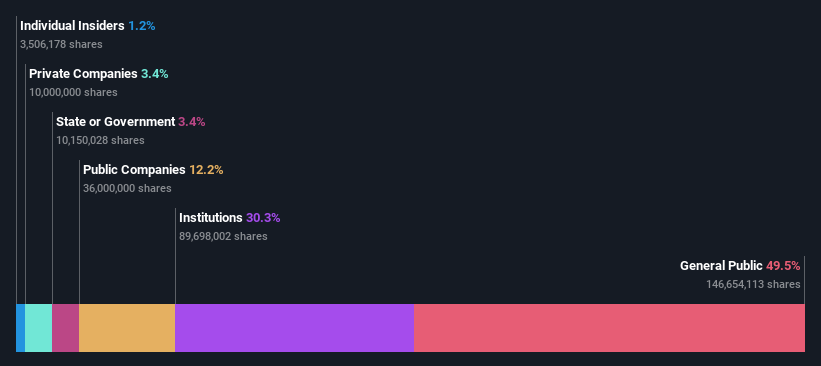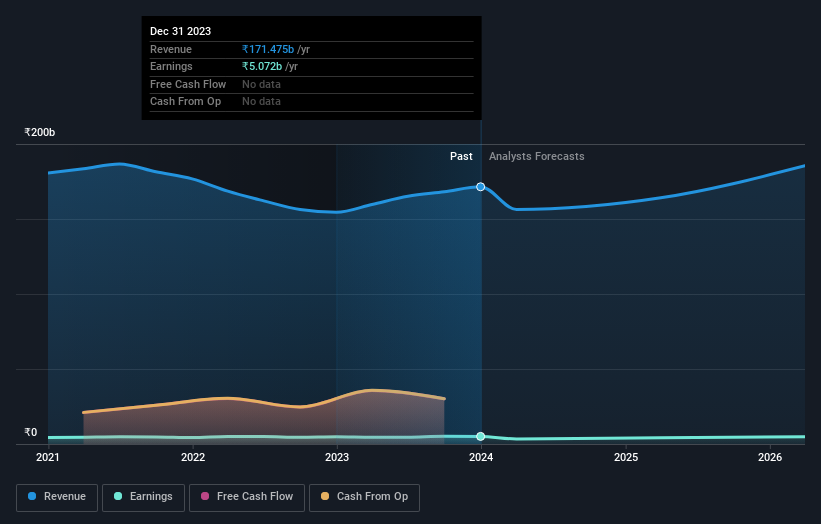Stock Analysis
- India
- /
- Renewable Energy
- /
- NSEI:PTC
Individual investors who have a significant stake must be disappointed along with institutions after PTC India Limited's (NSE:PTC) market cap dropped by ₹4.3b

Key Insights
- Significant control over PTC India by individual investors implies that the general public has more power to influence management and governance-related decisions
- A total of 25 investors have a majority stake in the company with 50% ownership
- 30% of PTC India is held by Institutions
If you want to know who really controls PTC India Limited (NSE:PTC), then you'll have to look at the makeup of its share registry. And the group that holds the biggest piece of the pie are individual investors with 50% ownership. Put another way, the group faces the maximum upside potential (or downside risk).
Following a 6.4% decrease in the stock price last week, individual investors suffered the most losses, but institutions who own 30% stock also took a hit.
In the chart below, we zoom in on the different ownership groups of PTC India.
Check out our latest analysis for PTC India

What Does The Institutional Ownership Tell Us About PTC India?
Many institutions measure their performance against an index that approximates the local market. So they usually pay more attention to companies that are included in major indices.
As you can see, institutional investors have a fair amount of stake in PTC India. This implies the analysts working for those institutions have looked at the stock and they like it. But just like anyone else, they could be wrong. It is not uncommon to see a big share price drop if two large institutional investors try to sell out of a stock at the same time. So it is worth checking the past earnings trajectory of PTC India, (below). Of course, keep in mind that there are other factors to consider, too.

PTC India is not owned by hedge funds. Looking at our data, we can see that the largest shareholder is BlackRock, Inc. with 5.8% of shares outstanding. Life Insurance Corporation of India, Asset Management Arm is the second largest shareholder owning 5.0% of common stock, and Power Finance Corporation Limited, Asset Management Arm holds about 4.1% of the company stock.
A closer look at our ownership figures suggests that the top 25 shareholders have a combined ownership of 50% implying that no single shareholder has a majority.
Researching institutional ownership is a good way to gauge and filter a stock's expected performance. The same can be achieved by studying analyst sentiments. There is a little analyst coverage of the stock, but not much. So there is room for it to gain more coverage.
Insider Ownership Of PTC India
The definition of company insiders can be subjective and does vary between jurisdictions. Our data reflects individual insiders, capturing board members at the very least. Company management run the business, but the CEO will answer to the board, even if he or she is a member of it.
Insider ownership is positive when it signals leadership are thinking like the true owners of the company. However, high insider ownership can also give immense power to a small group within the company. This can be negative in some circumstances.
We can see that insiders own shares in PTC India Limited. It has a market capitalization of just ₹63b, and insiders have ₹744m worth of shares, in their own names. It is good to see some investment by insiders, but it might be worth checking if those insiders have been buying.
General Public Ownership
The general public, who are usually individual investors, hold a 50% stake in PTC India. This size of ownership, while considerable, may not be enough to change company policy if the decision is not in sync with other large shareholders.
Private Company Ownership
Our data indicates that Private Companies hold 3.4%, of the company's shares. It might be worth looking deeper into this. If related parties, such as insiders, have an interest in one of these private companies, that should be disclosed in the annual report. Private companies may also have a strategic interest in the company.
Public Company Ownership
We can see that public companies hold 12% of the PTC India shares on issue. It's hard to say for sure but this suggests they have entwined business interests. This might be a strategic stake, so it's worth watching this space for changes in ownership.
Next Steps:
While it is well worth considering the different groups that own a company, there are other factors that are even more important. Like risks, for instance. Every company has them, and we've spotted 2 warning signs for PTC India (of which 1 is concerning!) you should know about.
Ultimately the future is most important. You can access this free report on analyst forecasts for the company.
NB: Figures in this article are calculated using data from the last twelve months, which refer to the 12-month period ending on the last date of the month the financial statement is dated. This may not be consistent with full year annual report figures.
Valuation is complex, but we're helping make it simple.
Find out whether PTC India is potentially over or undervalued by checking out our comprehensive analysis, which includes fair value estimates, risks and warnings, dividends, insider transactions and financial health.
View the Free AnalysisHave feedback on this article? Concerned about the content? Get in touch with us directly. Alternatively, email editorial-team (at) simplywallst.com.
This article by Simply Wall St is general in nature. We provide commentary based on historical data and analyst forecasts only using an unbiased methodology and our articles are not intended to be financial advice. It does not constitute a recommendation to buy or sell any stock, and does not take account of your objectives, or your financial situation. We aim to bring you long-term focused analysis driven by fundamental data. Note that our analysis may not factor in the latest price-sensitive company announcements or qualitative material. Simply Wall St has no position in any stocks mentioned.
About NSEI:PTC
PTC India
Engages in the trading of power in India, Nepal, Bhutan, and Bangladesh.
Established dividend payer with adequate balance sheet.


